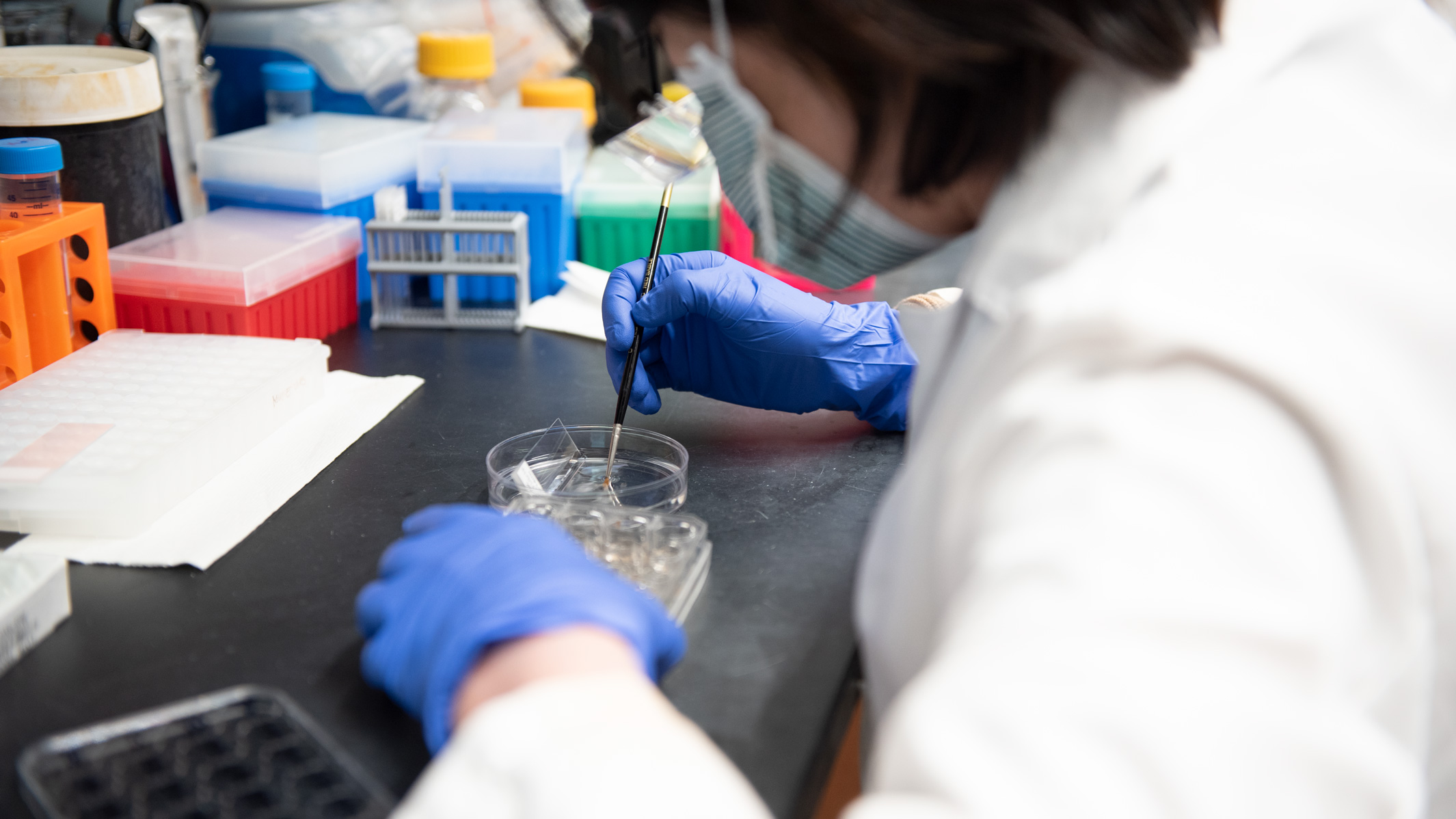Robert Mahley’s lab studies the cellular and molecular biology of apolipoprotein (apo) E, a protein involved in the transport of cholesterol and other fats. His team elucidated the structure and function of apoE and contributed to understanding its critical role in coronary heart disease and neurodegenerative disorders, including Alzheimer’s disease. There are three forms of apoE in humans, which his team defined, called apoE2, apoE3, and apoE4. Approximately 60 to 75 percent of all Alzheimer’s disease patients carry at least one copy of the apoE4 variant, making it the major genetic risk factor for Alzheimer’s disease. Correcting the abnormal structure of apoE4 represents a therapeutic target for Alzheimer’s disease.
Disease Areas
Areas of Expertise

Lab Focus
Research Impact
Mahley’s team examines the mechanisms and identifies the pathways by which apoE4 alters intracellular processes to understand the molecular basis for apoE4-associated neuropathology and provide new therapeutic approaches for Alzheimer’s disease. Their working hypothesis is that apoE4 sets the stage for neuropathology, and that second hits injure neurons, triggering apoE production.
They found that when apoE4 is synthesized by injured neurons, it undergoes proteolysis because of its abnormal structure, generating a series of neurotoxic fragments that disrupt intracellular processes, including tau biology and mitochondrial function. The mitochondrial dysfunction results in altered metabolism and impaired ATP production in neurons that likely contribute to apoE4-associated pathologic effects in Alzheimer’s disease. The Mahley Lab has identified small molecules (potential drugs) that correct the structure of apoE4 and protect the neurons from its detrimental effects, which hold promise for the treatment of Alzheimer’s disease.
Professional Titles
Senior Investigator, Gladstone Institutes
President Emeritus and Founder, Gladstone Institutes
Professor, Departments of Pathology and Medicine, UC San Francisco
Bio
Robert Mahley is a senior investigator, president emeritus, and founder of Gladstone Institutes. He is a professor of pathology and medicine at UC San Francisco. Mahley earned his BS from Maryville College and his MD and PhD from Vanderbilt University. In 1971, he joined the staff of the National Heart, Lung, and Blood Institute (NHLBI) and, in 1975, became head of the Comparative Atherosclerosis and Arterial Metabolism Section in NHLBI’s Laboratory of Experimental Atherosclerosis. Mahley was recruited 4 years later to create Gladstone Institutes. He is a member of the National Academy of Sciences, the National Academy of Medicine, and the American Academy of Arts and Sciences.
As Gladstone’s president, Mahley oversaw the organization’s establishment and growth, including the creation of the Gladstone Institute of Cardiovascular Disease, Institute of Virology and Immunology, and Institute of Neurological Disease. In 2006, he developed the Gladstone Center for Translational Research to facilitate the movement of Gladstone’s basic research into therapeutic development. Mahley’s research defined the critical role of apolipoprotein (apo) E in cholesterol homeostasis, atherosclerosis, and the nervous system. These findings laid the groundwork for the explosion of research linking apoE4—a variant of apoE—to the pathogenesis of Alzheimer’s disease and other neurodegenerative disorders.
His current research focuses on elucidating the cellular and molecular mechanisms whereby apoE4 results in neurodegenerative disorders, and on approaches for altering the detrimental effects of apoE4 in neurons. He has identified a series of small molecules that convert the abnormal structure of apoE4 to a much less toxic structure. In addition, his lab is focusing on how apoE4 expression in neurons impairs cellular metabolism and mitochondrial function.
How Did You Get Your Start in Science?
“As a summer student in college, I worked at a Vanderbilt University laboratory studying lipids and atherosclerosis. It was there that I first ‛saw’ apoE; the rest is history.”
Honors and Awards
2012 24th Annual Robert J. and Claire Pasarow Foundation Award in Cardiovascular Disease
2011 Salute to Excellence Award, American Liver Foundation
2011 Distinguished Scientist Award, American Heart Association
2010 Builders of Science Award, Research!America
2009 Outstanding Achievement Award for Contributing to Atherosclerosis Research, International Symposium on Atherosclerosis
2009 Award for Lifetime Achievement in Mentorship, Gladstone Postdoctoral Fellows
2007 American Academy of Arts and Sciences (Elected)
2006 Honorary Doctor of Medicine Degree, Maryville College
2001 Institute of Medicine (Elected)
2000 Distinguished Alumnus Award, Vanderbilt University
2000 National Academy of Sciences (Elected)
1995 Honorary Degree of Doctor in Medicine, University of Göteborg, Sweden
1995 DeWitt S. Goodman Award for Basic Science Achievement, National Cholesterol Education Program
1994 MetLife Award for Medical Research in Alzheimer’s Disease, MetLife Foundation
1989 CIBA-GEIGY Award in Biomedical Research
1987 George Lyman Duff Memorial Lectureship, American Heart Association
1982 Heinrich Wieland Prize, Boehringer Ingelheim Foundation
1970 Bordon Award for Basic Medical Research, Vanderbilt University
Publications
Contact
Robert Mahley
Email
415.734.2061
Ann Guiney
Executive Administrator
415.734.2062
Email

